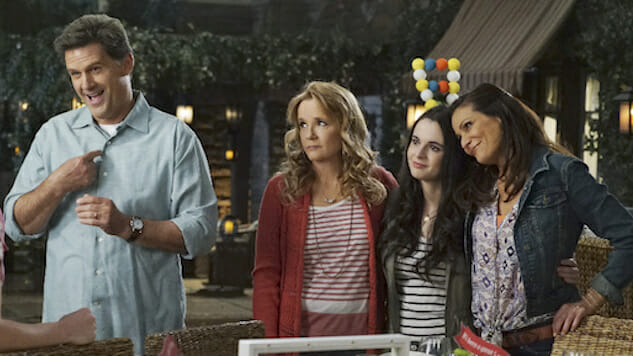Switched at Birth Was One of the Last Teen Dramas of a Bygone Age
Freeform
When I sat down to write about the series finale of Switched at Birth, I made a list of all the issues the show has tackled over the years: child abuse, sexual assault, sexual harassment, cyber bullying, alcoholism, the death of a parent, socioeconomic disparity, treatment of same sex couples in schools, steroid use, deafness and deaf culture, having a child with special needs, mental health, and drug use. And that’s just what I can remember off the top of my head.
Premiering in June 2011, the series followed Bay Kennish (Vanessa Marano) and Daphne Vasquez (Katie Leclerc) who, when they are 15 years old, realize they were switched at the hospital when they were born (has there ever been a more literal TV title?). Bay, who’s been raised in wealth and privilege by Katherine (Lea Thompson) and former pro baseball player John (D.W. Moffet), is actually the daughter of Regina (Constance Marie), a recovering alcoholic who struggles to make ends meet in East Riverside, a much less affluent part of Kansas City. Daphne, who lost her hearing at the age of three after a bout with meningitis, realized she inherited her love of cooking from Katherine and her sports acumen from John. Bay took after Regina’s artistic talent.
That’s a heavy premise to laden a TV series with, but creator and executive producer Lizzy Weiss deftly wove social issues with the stuff that makes teen soaps tick. Bay had a grand romance with Emmett (Sean Berdy), a motorcycle-loving quasi-bad boy. Daphne and Bay were always getting into some sort of trouble, whether it was blackmailing a senator, destroying public property or stealing prescription medication. Their older brother, Toby (Luca Grabeel), was not without drama either. (He had a penchant for getting married.)
As they redefined their family configuration, Switched at Birth saw the girls graduate from high school and start their post-high school life: Daphne became a pre-med student at the University of Missouri Kansas City (UMKC) and Bay turned her love of art into a career, eventually landing on being a tattoo artist.
In a rarity for shows aimed at teens, the series also gave equal weight to the adults, making them fully realized characters—not just people for the kids to roll their eyes at. Regina had multiple romances, reunited with Bay’s father, Angelo (Giles Marini), and tried various careers. Katherine and John had a loving marriage, but one in which they argued over important issues and dealt with difficult decisions together. They even still had sex! Katherine became a famous author and went on to lead the Athletic Department at UMKC—because, why not?—while John sold his car wash business and became the baseball coach at UMKC—because, again, why not?
The ensemble, most of whom learned American Sign Language (ASL) when they were cast, was phenomenal. Both Marano and Leclerc never made their story lines feel too much like a soap opera. Academy Award-winner Marlee Matlin recurred as Melody, Regina’s best friend and Emmett’s mom, raising every scene she appeared in to the next level. (A special shout-out to Ryan Lane, who recurred as Bay’s boyfriend, Travis, and made me fall a little bit more in love with him every time he was on the screen.)
-

-

-

-

-

-

-

-

-

-

-

-

-

-

-

-

-

-

-

-

-

-

-

-

-

-

-

-

-

-

-

-

-

-

-

-

-

-

-

-








































